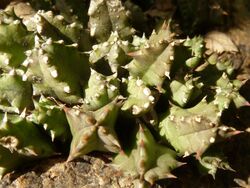Biology:Huernia hystrix
| Huernia hystrix | |
|---|---|

| |
| Growth form | |
| Scientific classification | |
| Kingdom: | Plantae |
| Clade: | Tracheophytes |
| Clade: | Angiosperms |
| Clade: | Eudicots |
| Clade: | Asterids |
| Order: | Gentianales |
| Family: | Apocynaceae |
| Genus: | Huernia |
| Species: | H. hystrix
|
| Binomial name | |
| Huernia hystrix (Hook.f.) N.E.Br.
| |
| Synonyms[1] | |
|
List
| |
Huernia hystrix, the porcupine huernia, is a species of flowering plant in the family Apocynaceae, native to southeastern Africa.[1][2] A succulent, it has gained the Royal Horticultural Society's Award of Garden Merit.[3]
H. hystrix is extensively sold in Zulu markets throughout South Africa for its supposed medicinal and protective magical properties,[4] and in Eswatini as an alleged aphrodisiac.[5] Extracts from its stem and leaves may contain chemicals with anti-inflammatory properties,[6] It has been proposed as a treatment for people suffering from HIV/AIDS.[7]
It is highly drought-tolerant and grows well in pots, and so is a good species for ornamental xeriscaping.[8] Destructive whole-plant harvesting has led to concerns about its survival.[9] Researchers at University of KwaZulu-Natal Botanical Garden have discovered multiple shoots can be propagated from a single explant by treatment with Murashige and Skoog medium + 1-Naphthaleneacetic acid + 6-Benzylaminopurine with 95% survival rates.[6]
Subtaxa
The following subspecies are accepted:[1]
- Huernia hystrix subsp. hystrix – KwaZulu-Natal, Northern Provinces, Swaziland, Mozambique, Zimbabwe
- Huernia hystrix subsp. parvula (L.C.Leach) Bruyns – KwaZulu-Natal, Cape Provinces
References
- ↑ 1.0 1.1 1.2 "Huernia hystrix (Hook.f.) N.E.Br.". Board of Trustees of the Royal Botanic Gardens, Kew. http://powo.science.kew.org/taxon/urn:lsid:ipni.org:names:98774-1.
- ↑ "Huernia hystrix (Porcupine Huernia)". World of Succulents. 2020. https://worldofsucculents.com/huernia-hystrix-porcupine-huernia. "Common Names ... Toad Plant"
- ↑ "Huernia hystrix". The Royal Horticultural Society. https://www.rhs.org.uk/Plants/8865/i-Huernia-hystrix-i/Details.
- ↑ Hutchings A, Scott AH, Lewis G, Cunningham AB (1996) Zulu medicinal plants. An inventory. University of Natal Press, Pietermaritzburg, South Africa
- ↑ Long, C. "Swaziland’s flora: siSwati names and uses." Swaziland National Trust Commission: Mbambane, Swaziland (2005).
- ↑ 6.0 6.1 Amoo, S. O.; Finnie, J. F.; Van Staden, J. (2009-03-01). "In vitro propagation of Huernia hystrix: an endangered medicinal and ornamental succulent" (in en). Plant Cell, Tissue and Organ Culture 96 (3): 273–278. doi:10.1007/s11240-008-9484-8. ISSN 1573-5044. https://doi.org/10.1007/s11240-008-9484-8.
- ↑ Asiedu, William; Asiedu Frederick & Ennin Manny et al., "Composition treating for AIDS and associated conditions", US patent application 2004052868, published 2004-03-18, since abandoned.
- ↑ Al-Turki TA (2002) An initiative in exploration and management of plant genetic diversity in Saudi Arabia. In: Engels JMM, Ramanatha Rao V, Brown AHD, Jackson MT (eds) Managing plant genetic diversity. IPGRI, Rome, Italy, pp 339–349
- ↑ Ndawonde, BG; Zobolo, AM; Dlamini, ET; Siebert, SJ (2007-07-01). "A survey of plants sold by traders at Zululand muthi markets, with a view to selecting popular plant species for propagation in communal gardens". African Journal of Range & Forage Science 24 (2): 103–107. doi:10.2989/AJRFS.2007.24.2.7.161. ISSN 1022-0119. https://doi.org/10.2989/AJRFS.2007.24.2.7.161.
Wikidata ☰ Q18073918 entry
 |

